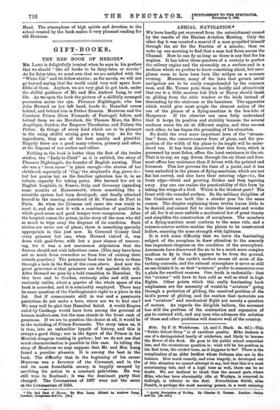GIFT-BOOKS.
THE RED BOOK OF HEROES.*
Mn. LANG is delightfully ironical when he says in his preface that we should "like all books to be fairy-tales or novels." As for fairy-tales, we must own that we are satisfied with the "White Cat" and its fellow-stories ; as for novels, we will not go beyond saying that the world could very well spare four- fifths of them. Anyhow, we are very glad to get back, under the skilful guidance of Mr. and Mrs. Andrew Lang, to real life. As we open the book the picture of a skilfully arranged procession meets the eye. Florence Nightingale, who has John Howard on her left hand, beads it; Hannibal comes behind, and behind him is Father Damien. Montrose and the Constant Prince (Dom Fernando of Portugal) follow, and behind them we see Havelock, Sir Thomas More, the Mere Angelique, Gordon, the Emperor Theodosius, and Palissy the Potter. In things of every kind which are to be pleasant in the using skilful mixing goes a long way. As for the ingredients, they are of the best quality and plentiful. Happily there are a good many colours, primary and other, at the disposal of our author and editor.
Nothing in the book is better than the first of the twelve studies, the " Lady-in-Chief " as it is entitled, the story of Florence Nightingale, the founder of English nursing. That she was a "born nurse" is plain enough—the stories of her childhood, especially of 'Cap,' the shepherd's dog, prove it— but her genius lay, as the familiar aphorism has it, in an infinite capacity for taking pains. She learned her art in English hospitals, in France, Italy, and Germany (spending some months at Kaiserswerth, where something like a scientific system had been developed), and finally attached herself to the nursing sisterhood of St. Vincent de Paul in Paris. So when the Crimean call came she was ready to meet it, and she met it with a combination of qualities in which good sense and good temper were conspicuous. After the hospital comes the prison, in the story of the man who did so much to wipe away the disgrace of its condition. Such stories are never out of place ; there is something specially appropriate in this just now. In Cornwall County Gaol every prisoner but one, when Howard visited it, was down with gaol-fever, with but a poor chance of recover- ing, for it was a not uncommon stipulation that the doctors should not visit infectious cases. (This may have been not so much from cowardice as from fear of ruining their outside practice.) The prisoners' food was let down to them through a hole in the floor of the room above. And now the great grievance is that prisoners are fed against their will. After Howard we pass by a bold transition to Hannibal. To this hero and to Gordon, curiously alike and still more curiously unlike, about a quarter of the whole space of the book is accorded, and it is admirably employed. There may be some question of the Carthaginian's right to a place in the list. But if consummate skill in war and a passionate patriotism do not make a hero, where are we to find one ? We may well be glad that Hannibal failed. A world-Empire ruled by Carthage would have been among the greatest of human misfortunes, but the man stands in the front rank of
greatness. If we are to question the choice at all, it would be in the including of Prince Fernando. The story takes us, it is true, into an unfamiliar bypath of history, and this is always a good thing ; nor is the figure of the Prince in his Moorish dungeon wanting in pathos ; but we do not see that much characterisation is possible in this case. In telling the story of Montrose we may suppose that Mr. and Mrs. Lang found a peculiar pleasure. It is among the best in the book. The difficulty that in the beginning of his career Montrose was a favourer of the Covenant, and in the end its most formidable enemy, is happily escaped by ascribing his action to a constant patriotism. He was still true to Scotland ; it was the .dominant party that changed. The Covenanters of 1637 were not the same au the Covenanters of 1650.
• Ti* Ito4 Book of Norco. By Dim. Lang. Edited by Andrew Lang. London; Longman.' mad Co. [8a.1 .






























































 Previous page
Previous page